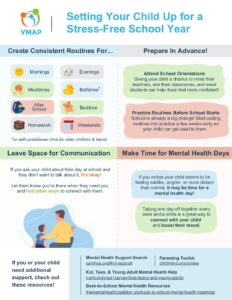Back-to-School: How to Support Your Child’s Mental Health
Back-to-School Can Spell S-T-R-E-S-S for Children and Teens
Nerves are a natural experience for children as a new school year approaches. Unfortunately, this state of heightened anxiety can persist in some children for longer than just the first day back. 75% of American high schoolers and 50% of middle schoolers describe themselves as feeling "often or always stressed" by schoolwork. Accordingly, children and teens are at higher risk for a mental/behavioral health crisis when school is in session, and they often need more mental health support. This is consistent with 76% of schools reporting an increase in staff concerns about students exhibiting symptoms of mental illness. Only 56% of these staff agree that they can effectively provide mental health services to all students in need, often due to understaffing. The current national average sits at 1 school counselor for every 1,211 students— well above the recommended ratio of 1 to 500.
As a parent, you may be wondering how to ease the anxiety your child feels during the back-to-school season, and how you can effectively support them when school stress arises. To help, we have a list below of poor mental health warning signs, steps to set your child up for a less stressful school year, and a directory of helpful resources.
If you're more interested in learning about mental health treatment options for your child, check out our Parent's Guide: When & How to Seek Mental Health Care for Your Child.
Warning Signs of Poor Mental Health in Children and Teens
Temporary changes in your child's mood before a test, a performance, or another stressful event are typical and expected. It can become a warning sign when these changes are long-lasting, intense, and/or distressing for your child. Warning signs aren't synonymous with your child having a mental illness—instead, they're an indication that something isn't right, and they may need more support. We have compiled a list of the most common symptoms to look out for, but you know your child best. If something seems off, trust your gut and ask your child's pediatrician for their insight, recommendations, and referrals!
Warning Signs in Younger Children
- Higher energy than their peers; they may have trouble focusing or staying still, except when they're occupied with screens
- Changes in their typical sleep patterns, or increases in nightmares
- An increase in tantrums and outbursts
- Complaints of headaches, tummy troubles, or other physical symptoms that don't seem to have a medical cause
- Difficulty (or lack of interest in) making friends
- Issues at school, including academic or behavioral challenges
- Obsessive behaviors or fixations on their worries and fears
Warning Signs in Older Children
- Decreased interest in things they used to enjoy, like hobbies and friendships
- Changes in their typical sleep patterns, or increases in nightmares
- Isolation from family and friends; more interest in being alone
- Fixation on eating, dieting, exercising, or losing weight
- Signs that they are harming themselves; talk of suicidal thoughts, even in passive or joking ways
- Risky behaviors, including drinking alcohol, driving recklessly, or using illicit drugs
- Mood swings and outbursts with higher highs and lower lows than usual
Setting Your Child Up for a Stress-Free School Year
Below are some ideas for helping your child enter the school year feeling confident, prepared, and ready to take on the challenges that await them. Every family and every child are different, so these tips will not apply in every situation—take what works and leave the rest!
-
Create (and Maintain) Consistent Routines
Daily routines can have wide-ranging positive impacts on children's physical, mental, and emotional health. One group of researchers reviewed 170 studies on how routines impact children, and here are just some of the benefits they were able to positively connect to routines. Click on the linked numbers to dive deeper into the data!
- Better cognitive functioning in infants1 and preschoolers2
- Better emotional and behavioral regulation3,4
- Better emotional understanding, empathy, and more enriched relationships5
- Better academic outcomes6,7,8
- Better mental health outcomes9,10,11
- Lower BMI and less obesity risk12,13
Additionally, routines also appear to be protective factors for children in low-income families and other high-risk situations, such as having parents with depression and parents who have divorced.
With so many positive benefits to having consistent routines, you may be wondering how to implement them in your home or improve the ones you have in place. Start by thinking about the steps you and your children follow for certain activities or times of the day, or ones you wish you did. We like to break up routines into the following categories and build them out from there!
- Mornings: Mornings, especially on school days, can be chaotic. Setting expectations for how the morning will go is an important part of getting everyone out the door on time.
- Mealtimes: If you don't already, meal planning and meal prepping are great habits to reduce the stress of figuring out what everyone is going to eat. It can help reduce confusion for you and your child about what meal is coming next. If you find a few things your child really enjoys eating, you can cycle through them to keep it interesting.
- After School: When your child gets off the bus after a long day at school, what should they do? Should they unpack their school bags and put their lunch boxes in the kitchen? Do you want them to have some quiet time, or is it time for a snack? Whatever you decide, try to keep it the same each day so they know what to expect when they get home.
- Homework: It can be hard to motivate children to do their homework, and even harder to build a routine around it. This article from Child Mind Institute outlines some great ways to create a homework routine, including ways to incentivize your child to get it done.
- Evenings: Maybe your child has soccer practice one night, karate the next, and nothing the night after. It's hard to keep an evening routine the same when that's the case. That's why they should be adaptable! You might have a different routine on some days than you do on others, but make sure your child knows what to expect for each one.
- Bathtime/Showers/Self-Care Time: No matter how old your child is, setting time aside in the evenings for them to take care of their body is important. If your child doesn't want to take a bath or shower every night (or doesn't need to), you can swap it out for gentle stretching, yoga, or affirmations. Here are some great self-care habits for kids and for teens that you can share with your child.
- Bedtime: Keeping bedtime at the same time each night matters—structured sleep is important for development, focus, memory, energy, and much more! Even if they "don't feel tired" when it's bedtime (we've all heard that one before), having them play quietly or read in their room with the lights low and jammies on usually ends in them falling asleep on their own.
- Weekends: It can be hard to maintain routines on the weekends when it feels like there's so much to do to get ready for the week ahead, but you still want to spend this valuable time off work balancing the needs of you and your child with fun family adventures. Just like evenings, weekend routines should be adaptable. Whenever there is a change to the weekend routine, do your best to let your child know ahead of time!
-
Prepare in Advance!
Recent studies have explored the benefits of "mental rehearsal", or the act of imagining yourself doing something before you do it. They have found that mental rehearsal can help us do better when we're faced with the real thing, along with reducing our anxiety about it. For example, imagining yourself giving a stressful presentation or doing a job interview can help you prepare for the real thing. This is something you can apply to help reduce your child's nerves about school—and here's how!
Attend School Orientation
School orientations are a great way to help your child feel prepared for their new school year. They can meet their teachers, see their classrooms, and get their schedules. No matter what age your child is, it can be beneficial for them to attend these orientations to calm anxieties they may have about starting school. Even if there isn't an orientation at your school, make a trip there with your child to look at the building and familiarize them with the grounds.
Practice Routines Before School Starts
School is already a big change, and it can be challenging for children (especially younger ones!) to adapt to new routines at the same time. To combat this, you can try implementing routines before summer ends to help your child acclimate to them. When you introduce a routine, it might help to use visual flip or slide charts for younger children and task lists with checkboxes for older children and teens!
-
Leave Space for Communication
It can be hard to always communicate effectively with your child, no matter how old they are. Here are some tips for having conversations that you both feel good about!
- Listen actively: listening actively and reflectively to your child is key—focus more on what they're saying versus what you want to say. If you want to learn more about this skill, check out this resource from the CDC!
- Use "noticing" statements: a great opener to a conversation is saying something like, "I noticed you did a great job on your homework today," or mentioning another behavior that you're impressed by.
- Make time for fun: if every interaction you have with your child is asking them to do something or giving them negative attention, it can quickly sour your connection with them. Make a conscious effort to have fun with your child—play is another form of communication!
- Don't overcommunicate: it's tempting to repeat ourselves or overexplain something in the hopes that it will really sink in, but this doesn't usually go the way we want it to. Words aren't always needed—it's okay to circle back to it later and give your child a chance to digest your conversation.
-
Make Time for Mental Health Days
A law was passed in 2020 requiring the establishment of guidelines to grant Virginia students an excused absence for mental or behavioral health reasons. Each school district handles this ruling differently, but as student stress continues to climb, mental health days are becoming more normalized. Here's a great guide from Child Mind Institute that helps determine when a mental health day might be warranted for your child. Below are some ideas for what you can do with your child to make the most of their mental health day!
- Taking a walk outside together
- Going on a nature scavenger hunt
- Baking, painting, or drawing together
- Getting a special treat together
- Visit their favorite place
- Letting them lead the day and choose what they want to do
Even with all the preparation in the world, school is full of stressors—it's impossible to avoid them all. We've linked some resources below that offer advice on how to support your child and their mental health this school year. As always, if you're concerned about your child's health, reach out to their pediatrician and get their professional opinion. Their pediatrician can contact the VMAP Line to request additional support and care navigation regarding your child's case if needed.
Resources for Parents:
- SAMSHA: Find Mental Health Support
- SAMSHA: Supporting Children's Mental Health During Back-to-School Season
- Child Mind Institute: Parent Guides on Different Mental Health Conditions
- Mental Health Coalition: Back-to-School Mental Health Roadmap
- NAMI: Seeking Mental Health Accommodations for Your Child
- Kids' Minds Matter: Tips for Back-to-School Mental Health





